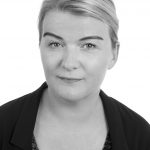Sunna is an Adjunct Lecturer and post-doc at the University of Iceland.
In 2012 I was a 31-year-old mother of two who had just started my PhD in sociology at the University of Iceland. My topic of choice was motherhood – a topic I felt had been abandoned by feminism and academics in general, not relevant, perhaps a little bit old fashioned and therefore not deserving of critical engagement. I was on the other hand completely obsessed with my topic of choice and I had a sense of the cultural climate having somehow changed.
I noticed that there was a lot of anxiety regarding motherhood and pressure, so much pressure! For me, there seemed to be a shift in the way that we as a society constructed the roles and responsibilities of mothers, especially mothers of young children. The implication was that mothering should be made harder, more difficult, and time consuming, and that your identity as a person should be based mostly on your role as a mother. This, as I later came to understand, is representative of the ideology of intensive mothering, as explained by Sharon Hays (1996) in her book The Cultural Contradictions of Motherhood and seemed to me completely unsuited to the Icelandic context. In my home country of Iceland gender equality and shared parenting are presented as goals and feminist rhetoric has been successfully incorporated into political discourse, at both national and individual levels. But still dominant discourses on mothering in Iceland point to an intensification of mothering by constructing motherhood and breastfeeding as something natural, free of social conventions and troublesome intrusions like gender equality.
I wrote my research proposal based on those half-formed ideas based on personal experiences and observations and was accepted into the program. As I started my work I was fortunate enough to come across the Centre for Parenting Culture Studies. The Centre´s blog had so many useful resources for me and pointed me in the direction of several important scholars who would enhance my understanding of parenting and help me contextualize my own findings. Academic engagement with intensive mothering, breastfeeding, attachment parenting and the expansion of parenthood, and motherhood in particular, have all informed my own work and brought context and clarity to my original ideas and research findings. I was lucky enough to have Ellie Lee as a member of my doctoral committee and Charlotte Faircloth served as an external examiner for my PhD viva in 2017. They have been tremendously supportive of me and my work ever since and I am so very grateful to them for all their support and academic inspiration. I belong to a small research community and this makes the existence of CPCS as an international and multidisciplinary forum for researchers even more important and valuable.
